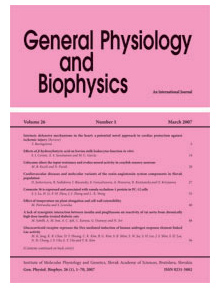Journal info
Aims and Scope |
||
Select Journal
Journals
Bratislava Medical Journal Endocrine Regulations General Physiology and Biophysics 2024 2023 2022 2021 2020 2019 2018 2017 2016 2015 2014 2013 2012 2011 2010 2009 2008 2007 Neoplasma Acta Virologica Studia Psychologica Cardiology Letters Psychológia a patopsych. dieťaťa Kovove Materialy-Metallic Materials Slovenská hudbaWebshop Cart
Your Cart is currently empty.
Info: Your browser does not accept cookies. To put products into your cart and purchase them you need to enable cookies.
General Physiology and Biophysics Vol.36, No.4, p.471–479, 2017 |
||
| Title: Evaluation of liposomal carnosine in adjuvant arthritis | ||
| Author: Lukáš Slovák, Silvester Poništ, Tatiana Fedorova, Anna Logvinenko, Irina Levacheva, Olga Samsonova, Udo Bakowsky, Ľudmila Pašková, Tomáš Čavojský, Lia Tsiklauri, Katarína Bauerová | ||
| Abstract: Liposomal carnosine could overcome the problems associated with direct application of this peptide. Anti-inflammatory and antioxidant effects of liposomal and non-liposomal carnosine in adjuvant arthritis were compared. The experiments were done on healthy animals, untreated arthritic animals, arthritic animals with oral administration of carnosine, and with subcutaneous administration of liposomal carnosine, both administered in the same daily dose of 150 mg/kg b.w. during 28 days. Carnosine reduced hind paw volume on day 28. Both forms markedly decreased interleukin-1β, matrix metalloproteinase-9 and monocyte chemoattractant protein-1 (MCP-1) in plasma on day 14. Only liposomal carnosine reduced significantly MCP-1. Malondialdehyde, 4-hydroxynonenal, resistance to Fe2+-induced oxidation and protein carbonyls were significantly corrected after administration of any form of carnosine. Liposomal carnosine corrected more effectively the oxidative stress in plasma than did carnosine. In brain tissue, our results showed protective ability of both forms of carnosine against oxidation of proteins and lipids. They also corrected the resistance to Fe2+-induced oxidation in arthritic animals. We found that only liposomal carnosine decreased the mRNA expression of inducible nitric oxide synthase in cartilage tissue. It can be concluded that the liposomal drug-delivery system is improving the pharmacological properties of carnosine administered in arthritis. |
||
| Keywords: Liposomes — Adjuvant arthritis — Oxidative stress — Carnosine — Inflammation | ||
| Published online: 13-Sep-2017 | ||
| Year: 2017, Volume: 36, Issue: 4 | Page From: 471, Page To: 479 | |
| doi:10.4149/gpb_2017014 |
||
|
|
 download file download file |
|

